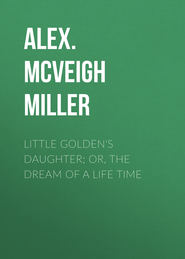По всем вопросам обращайтесь на: info@litportal.ru
(©) 2003-2024.
✖
Pretty Geraldine, the New York Salesgirl; or, Wedded to Her Choice
Настройки чтения
Размер шрифта
Высота строк
Поля
She gazed at him in cold astonishment at this audacity, but answered, frigidly:
"Your solicitude does you credit, but I can satisfy all your doubts."
Beckoning the conductor, who was passing through the car, she said, quietly:
"Kindly tell this person my name and standing."
Standish winced under the contemptuous epithet, "person," and glared at the conductor, who turned to him and said:
"Mrs. A. T. Fitzgerald, formerly of New York, now of Chicago, was the wife, now the widow, of A. T. Fitzgerald, the foremost banker and capitalist of Chicago."
Standish bowed without a word. He saw the impassable gulf of wealth and social position yawning between him and pretty Geraldine, but he swore to himself that he would not give her up.
Mrs. Fitzgerald thanked the conductor, and added:
"No doubt you are familiar with the circumstances of my first marriage, and—divorce. Kindly tell him these also."
The conductor looked embarrassed, but she smiled at him encouragingly, and said:
"Do as I ask you, please. It is indeed a favor."
"Mrs. Fitzgerald's first husband was Howard Harding, of New York, from whom she obtained a divorce ten or eleven years ago."
"State the cause," broke in Mrs. Fitzgerald's clear voice, and the conductor, who was fully conversant with this scandal in high life, added:
"Howard Harding led a gay life, and deserted Mrs. Harding for a notorious Parisian of the demi-monde. His wife secured a divorce, and in about two years married Mr. Fitzgerald, of Chicago."
"And the custody of their only child, little Geraldine, was given–" she began.
"To the mother, of course," ended the conductor.
"Yes, and within a year she was stolen from her by the guilty father and hidden from her so securely that she never found her again until to-night," cried the lady, her eyes resting tenderly on the face of her lovely child.
"Is it so indeed? Let me congratulate you most heartily, madame," exclaimed the conductor, his eyes resting admiringly on Geraldine, while he added: "The likeness between you is most startling."
"And, oh, mother, dear mother, it was this kind gentleman who came to me in another coach and begged me to come and comfort you in your sorrow. But for him we might never have found each other," cried Geraldine, in boundless gratitude, for she felt that not only had he restored her to her mother's arms, but he had also delivered her from the power of her desperate lover.
Mrs. Fitzgerald, who had been so frigid to Standish, unbent from her haughty mien and wept tears of gratitude as she wrung the hand of the conductor.
"Oh, Captain Stevens, as kind as you have always been to me on my journeys on your train, I never knew your true worth till now, but ere long you shall receive ample evidence of my gratitude," she assured him.
The conductor was very proud and happy over his agency in restoring Geraldine to her mother's arms, but while he was declining her promised reward, he was called away, and then Mrs. Fitzgerald turned again to her daughter's suitor.
"Are you satisfied with my proofs?" she demanded, icily.
"Perfectly, madame, and I hope you will permit me to express my joy at your reunion with your daughter."
"I thank you, and I have a request to make of you. I wish to be left alone with my daughter at present. Will you kindly respect this desire, and call on me later in Chicago, where I will consider your claims for my Geraldine's hand?" said Mrs. Fitzgerald, presenting him with a card on which was engraved her address on Prairie avenue.
Thus coolly dismissed, and not daring to protest against the authority of the haughty lady, Standish bowed and withdrew to another seat in the same coach, where he covertly watched them without daring to intrude his hated presence on them.
"Ah my darling, how strangely all this has happened!" cried the lady.
"How strangely and how fortunately!" echoed Geraldine, gladly.
"But, oh, how sad that it did not happen sooner—before my darling husband died! Oh, how he would have loved you for my sake, Geraldine; for he was so good to me, he made me so happy, that no grief remained in my heart for that false one who deserted me for a wicked woman, and then stole you away from me!" cried her mother, her mournful thoughts reverting to that loved lost one whose pulseless form had now been conveyed to another coach to be made ready for its last long sleep.
"Oh, my mother, how can I comfort you for your sad loss?" cried Geraldine, tenderly.
"You can love me, darling, and try to fill the void left by his loss. Oh, I hope that his kind spirit hovers near and knows that I have found you, my dear, for we have wished for this so often, and he has spent many thousands of dollars trying to trace you for me, but all in vain. For all our efforts were made abroad, in the belief that your father had taken you away with him. I could not conceive of his taking you away and then deserting you so heartlessly. But doubtless that wicked woman induced him to do it. Such women have great influence over weak-minded men. But let us try to forgive him the wrongs we suffered at his hands now that he is dead," ended Mrs. Fitzgerald.
CHAPTER XXXII.
"YOU WILL SOON FORGET YOUR POOR LOVER IN THE NEW SPHERE THAT YOU WILL FILL."
"She has a suitor rich, and I am poor,
And love 'gainst money has no armor sure;
For it is said when poverty appears,
Love through the window straight his pathway steers.
She's only human; it may be that she
Will barter love for wealth and misery."
Francis S. Smith.
How bitter was the disappointment of Harry Hawthorne on reaching the first station on his route in following the fugitives to find that his telegram had not been received until the Pennsylvania Limited had thundered past with the triumphant actor and his helpless victim.
His heart sank at the first moment with a terrible despair, but hope quickly reasserted itself.
"I will follow them!" he exclaimed, determined to leave no effort untried to rescue his heart's darling.
But the train with the fugitives was two hours ahead of the desperate lover, and long ere he reached Chicago the objects of his pursuit were at their destination—Standish in a second-rate lodging-house, Geraldine, with her mother, at her magnificent home on Prairie avenue, which holds to Chicago the rank of Fifth avenue to New York.
To Geraldine it was a wonderful transition, this change from the simple life of a working-girl in New York to this palatial home, where obsequious servants sprang to gratify her slightest wish, and where a devoted mother found time even in the anguish of widowhood to lavish on her the fondest love and care.
And in that home she had found another charming surprise—a dear little half-brother and sister, the children of her mother's second marriage—Earl, a beautiful, manly boy of ten, and Claire, a lovely fairy of seven years.
These two children had been left at home with their governess while their parents made a hurried business trip to New York—the trip that had ended so disastrously to the father, who had been in declining health for several years.
Bitter was the grief of the little ones when called to gaze for the last time on his beloved face, and Geraldine's tears mingled with theirs, for she knew that had he lived he must have proved to her a tenderer parent than the heartless father who had deserted her mother and then stolen her child and left her to grow up in poverty and heart-loneliness.
The second day after their arrival in Chicago the sacred remains of the beloved dead were taken to a crematory, and reduced to ashes, in accordance with the will of the deceased.
But the wife to whom he had been so kind and devoted could not bear to consign his remains to kindred dust.
She had the precious ashes sealed in a beautiful box of wrought silver and gold studded with precious jewels, and kept this box in her own apartments, a sacred treasure, dear to her for its precious memories.
When all these solemn ceremonies were over, the mother was ready to hear the story that Geraldine was waiting to pour into her ears.
A note from Clifford Standish arrived the morning after Mr. Fitzgerald's cremation, asking when he might call on Geraldine.
"Your solicitude does you credit, but I can satisfy all your doubts."
Beckoning the conductor, who was passing through the car, she said, quietly:
"Kindly tell this person my name and standing."
Standish winced under the contemptuous epithet, "person," and glared at the conductor, who turned to him and said:
"Mrs. A. T. Fitzgerald, formerly of New York, now of Chicago, was the wife, now the widow, of A. T. Fitzgerald, the foremost banker and capitalist of Chicago."
Standish bowed without a word. He saw the impassable gulf of wealth and social position yawning between him and pretty Geraldine, but he swore to himself that he would not give her up.
Mrs. Fitzgerald thanked the conductor, and added:
"No doubt you are familiar with the circumstances of my first marriage, and—divorce. Kindly tell him these also."
The conductor looked embarrassed, but she smiled at him encouragingly, and said:
"Do as I ask you, please. It is indeed a favor."
"Mrs. Fitzgerald's first husband was Howard Harding, of New York, from whom she obtained a divorce ten or eleven years ago."
"State the cause," broke in Mrs. Fitzgerald's clear voice, and the conductor, who was fully conversant with this scandal in high life, added:
"Howard Harding led a gay life, and deserted Mrs. Harding for a notorious Parisian of the demi-monde. His wife secured a divorce, and in about two years married Mr. Fitzgerald, of Chicago."
"And the custody of their only child, little Geraldine, was given–" she began.
"To the mother, of course," ended the conductor.
"Yes, and within a year she was stolen from her by the guilty father and hidden from her so securely that she never found her again until to-night," cried the lady, her eyes resting tenderly on the face of her lovely child.
"Is it so indeed? Let me congratulate you most heartily, madame," exclaimed the conductor, his eyes resting admiringly on Geraldine, while he added: "The likeness between you is most startling."
"And, oh, mother, dear mother, it was this kind gentleman who came to me in another coach and begged me to come and comfort you in your sorrow. But for him we might never have found each other," cried Geraldine, in boundless gratitude, for she felt that not only had he restored her to her mother's arms, but he had also delivered her from the power of her desperate lover.
Mrs. Fitzgerald, who had been so frigid to Standish, unbent from her haughty mien and wept tears of gratitude as she wrung the hand of the conductor.
"Oh, Captain Stevens, as kind as you have always been to me on my journeys on your train, I never knew your true worth till now, but ere long you shall receive ample evidence of my gratitude," she assured him.
The conductor was very proud and happy over his agency in restoring Geraldine to her mother's arms, but while he was declining her promised reward, he was called away, and then Mrs. Fitzgerald turned again to her daughter's suitor.
"Are you satisfied with my proofs?" she demanded, icily.
"Perfectly, madame, and I hope you will permit me to express my joy at your reunion with your daughter."
"I thank you, and I have a request to make of you. I wish to be left alone with my daughter at present. Will you kindly respect this desire, and call on me later in Chicago, where I will consider your claims for my Geraldine's hand?" said Mrs. Fitzgerald, presenting him with a card on which was engraved her address on Prairie avenue.
Thus coolly dismissed, and not daring to protest against the authority of the haughty lady, Standish bowed and withdrew to another seat in the same coach, where he covertly watched them without daring to intrude his hated presence on them.
"Ah my darling, how strangely all this has happened!" cried the lady.
"How strangely and how fortunately!" echoed Geraldine, gladly.
"But, oh, how sad that it did not happen sooner—before my darling husband died! Oh, how he would have loved you for my sake, Geraldine; for he was so good to me, he made me so happy, that no grief remained in my heart for that false one who deserted me for a wicked woman, and then stole you away from me!" cried her mother, her mournful thoughts reverting to that loved lost one whose pulseless form had now been conveyed to another coach to be made ready for its last long sleep.
"Oh, my mother, how can I comfort you for your sad loss?" cried Geraldine, tenderly.
"You can love me, darling, and try to fill the void left by his loss. Oh, I hope that his kind spirit hovers near and knows that I have found you, my dear, for we have wished for this so often, and he has spent many thousands of dollars trying to trace you for me, but all in vain. For all our efforts were made abroad, in the belief that your father had taken you away with him. I could not conceive of his taking you away and then deserting you so heartlessly. But doubtless that wicked woman induced him to do it. Such women have great influence over weak-minded men. But let us try to forgive him the wrongs we suffered at his hands now that he is dead," ended Mrs. Fitzgerald.
CHAPTER XXXII.
"YOU WILL SOON FORGET YOUR POOR LOVER IN THE NEW SPHERE THAT YOU WILL FILL."
"She has a suitor rich, and I am poor,
And love 'gainst money has no armor sure;
For it is said when poverty appears,
Love through the window straight his pathway steers.
She's only human; it may be that she
Will barter love for wealth and misery."
Francis S. Smith.
How bitter was the disappointment of Harry Hawthorne on reaching the first station on his route in following the fugitives to find that his telegram had not been received until the Pennsylvania Limited had thundered past with the triumphant actor and his helpless victim.
His heart sank at the first moment with a terrible despair, but hope quickly reasserted itself.
"I will follow them!" he exclaimed, determined to leave no effort untried to rescue his heart's darling.
But the train with the fugitives was two hours ahead of the desperate lover, and long ere he reached Chicago the objects of his pursuit were at their destination—Standish in a second-rate lodging-house, Geraldine, with her mother, at her magnificent home on Prairie avenue, which holds to Chicago the rank of Fifth avenue to New York.
To Geraldine it was a wonderful transition, this change from the simple life of a working-girl in New York to this palatial home, where obsequious servants sprang to gratify her slightest wish, and where a devoted mother found time even in the anguish of widowhood to lavish on her the fondest love and care.
And in that home she had found another charming surprise—a dear little half-brother and sister, the children of her mother's second marriage—Earl, a beautiful, manly boy of ten, and Claire, a lovely fairy of seven years.
These two children had been left at home with their governess while their parents made a hurried business trip to New York—the trip that had ended so disastrously to the father, who had been in declining health for several years.
Bitter was the grief of the little ones when called to gaze for the last time on his beloved face, and Geraldine's tears mingled with theirs, for she knew that had he lived he must have proved to her a tenderer parent than the heartless father who had deserted her mother and then stolen her child and left her to grow up in poverty and heart-loneliness.
The second day after their arrival in Chicago the sacred remains of the beloved dead were taken to a crematory, and reduced to ashes, in accordance with the will of the deceased.
But the wife to whom he had been so kind and devoted could not bear to consign his remains to kindred dust.
She had the precious ashes sealed in a beautiful box of wrought silver and gold studded with precious jewels, and kept this box in her own apartments, a sacred treasure, dear to her for its precious memories.
When all these solemn ceremonies were over, the mother was ready to hear the story that Geraldine was waiting to pour into her ears.
A note from Clifford Standish arrived the morning after Mr. Fitzgerald's cremation, asking when he might call on Geraldine.











